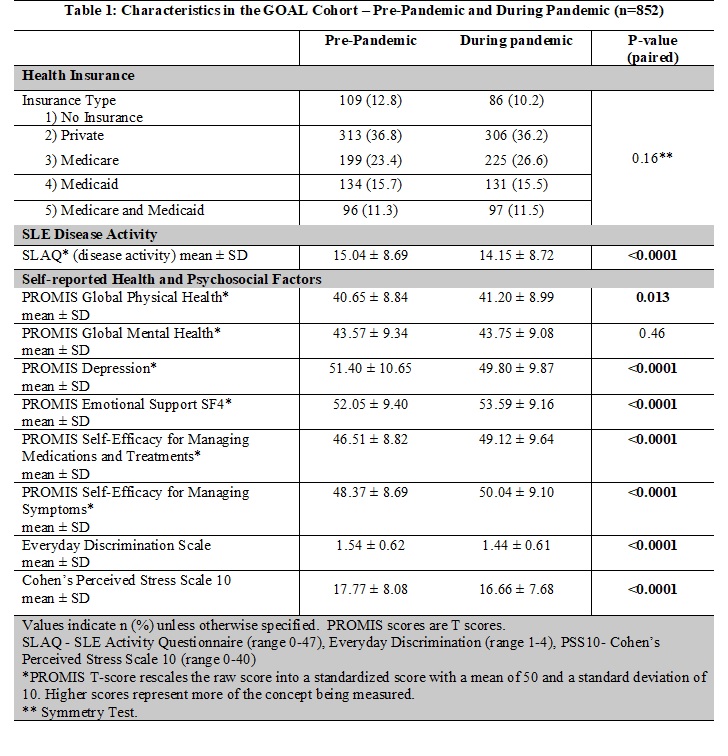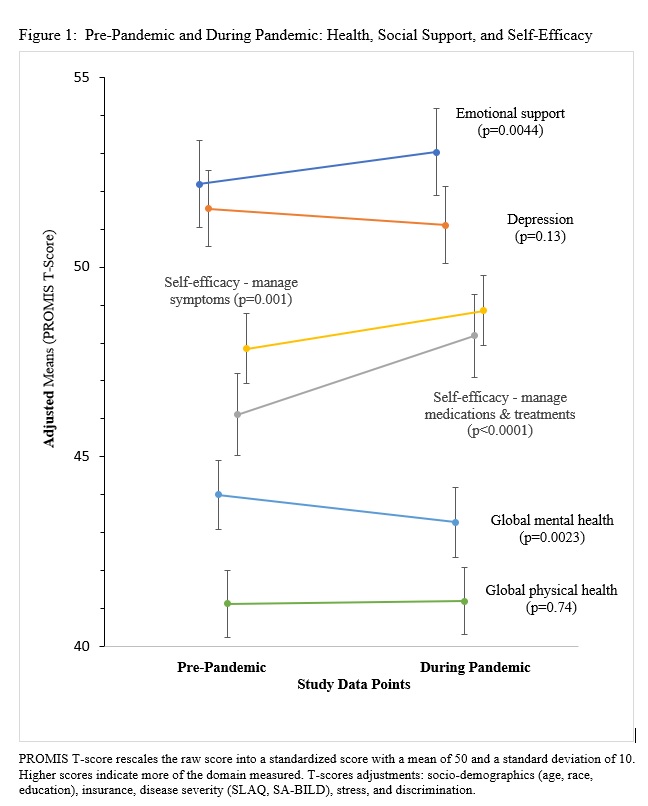Session Information
Session Type: Poster Session A
Session Time: 8:30AM-10:30AM
Background/Purpose: Disruptions of routines or livelihood and worry during the COVID-19 pandemic may have impacted systemic lupus erythematosus (SLE) patients in multiple ways. We explored pre- and during pandemic changes of SLE disease activity, general health, and psychosocial factors in a large and diverse cohort.
Methods: We examined longitudinal data from Georgians Organized Against Lupus (GOAL), a population-based cohort of adults from Atlanta, Georgia, with a validated diagnosis of SLE. All participants fulfilled 3 or more ACR classification criteria and had a final diagnosis of SLE by a board-certified rheumatologist. Participants responded to validated self-administered instruments on health outcomes at least annually. This study included participants who completed one survey before (2017-2019) and another survey during the pandemic (2020-2021). We explored changes in SLE disease activity, health, and psychosocial elements with the following measures: Systemic Lupus Activity Questionnaire (SLAQ), PROMIS short forms (Global physical and mental health, Depression, Emotional Support, Self-efficacy for managing symptoms, Self-efficacy for managing medications and treatments), Everyday Discrimination Scale, and Cohen’s Perceived Stress Scale. Changes in mean scores were assessed using a paired test (univariate analysis). Multivariate regression analysis was performed to further exam differences, with the adjustments for socio-demographics (age, gender, race, education), insurance status, disease damage, stress, and discrimination.
Results: We evaluated 852 participants (94% women, 81% Black, mean age 48). SLE-related characteristics included an average age of diagnosis of 32.2 years (SD ± 11.8), average disease duration of 15.5 years (SD ± 10.2), and over 50% with severe disease damage based on the Self-administered Brief Index of Lupus Damage (score ≥ 3). Overall, insurance categories remained without significant changes during the pandemic (Table 1). Except for global mental health, all measures showed significantly better mean scores during the pandemic than pre-pandemic. After adjustments for confounders, mean scores for emotional support and self-efficacy remained markedly better during the pandemic than before the pandemic (Figure 1). The original paired test showed no difference for global mental health; however, mental health was associated with significant worsened change after adjustments.
Conclusion: Our results in a diverse cohort with large numbers of socially vulnerable people show that participants reported improved confidence to manage symptoms, medications, and other treatments in challenging times. Additionally, they received more emotional support during the pandemic. However, global mental health deteriorated. We hypothesize that the stay-at-home pandemic recommendations allowed patients to seek out supportive resources and focus on self-management. Further observations post-pandemic will offer more insight regarding the mental health impact on SLE.
To cite this abstract in AMA style:
Dunlop-Thomas C, Bao G, Lim S, Drenkard C. Psychosocial and Health Measures in Systemic Lupus Erythematosus: Before and During the COVID-19 Pandemic in the Georgian’s Organized Against Lupus Cohort [abstract]. Arthritis Rheumatol. 2021; 73 (suppl 9). https://acrabstracts.org/abstract/psychosocial-and-health-measures-in-systemic-lupus-erythematosus-before-and-during-the-covid-19-pandemic-in-the-georgians-organized-against-lupus-cohort/. Accessed .« Back to ACR Convergence 2021
ACR Meeting Abstracts - https://acrabstracts.org/abstract/psychosocial-and-health-measures-in-systemic-lupus-erythematosus-before-and-during-the-covid-19-pandemic-in-the-georgians-organized-against-lupus-cohort/


